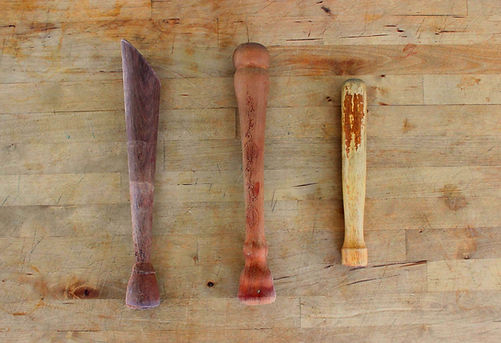Overview
Muddlers are for crushing up fresh ingredients such as fruit or herbs to incorporate their flavors into a cocktail, say for a strawberry daiquiri or mint julep. The main differences between muddlers are their length and what they're made from. But just about any of them can get the job done. It's a fairly basic tool, really just a pestle without a mortar.
Of course, some are better than others. I recommend using muddlers that are longer. Most retail options are 8 inches long, but around 10 inches or more is ideal, because the make muddling easier and more efficient.
Longer muddlers generally have a wider handle end which presses more comfortably into your palm and has a wider base, which covers more muddling ground. The added length also keeps your fingers and knuckles away from the rim of the mixing glass or shaker tin, freeing you up to apply more pressure. You can find more details about muddling technique on the muddling page.
A muddler's material makes less of a difference, though I prefer wooden muddlers because they look better and I find wood to be more tactilely satisfying to work with.
-
2. Other Great Wooden Muddlers. The muddlers listed below are also all excellent. Each is 10 inches and only around $10. Regretfully, none of these are the one pictured at #2 above. That is a piece of swag I got at an event. I haven't been able to find them for sale anywhere.
-
3. Winco Muddler - This is probably the most common muddler available. It was the first one I owned and lacks pretty much all the attributes I look for in a muddler. It's 8 inches, lacquered (initially) and has a narrow handle. But that's not to say you can't make a good cocktail with it. And at less that $5, you can't beat the price. I mainly wouldn't recommend it for bartenders of higher volume cocktail bars.
Muddlers
Purchase:
-
1. Pug Muddler - My Favorite! - This my favorite muddler I've worked with. Woodworker Chris Gallagher makes them by hand up in Cornwall, NY. They're 11.5 inches long with a slanted handle that fits into your hand like a glove and are absolutely gorgeous.
Muddler Alternative
If you don't have a muddler, this is your chance to channel your inner MacGuyver. Look for anything broad and blunt. The handle end of a hammer works quite well, as does the leg of an old chair, sterilized of course.
You can also easily make you own muddler. Buy a wooden dowel at any hardware store, say 1 - 1 1/2 inches thick, cut it to whatever length you want (10 inches!), which many stores will do for you. Then sand off the rough edges and coat it in oil to give it some shine. Or you can go with Jeffery Morganthaler's approach: take a french style rolling pin, which has no handles and cut it in half. Presto: two great muddlers.
Purchase: Here are a few of the many options available in this style.
-
1. Cocktail Kingdom Badass Muddler - Very durable, very heavy, all plastic. You certainly don't have to work as hard to crush anything with this guy.
-
2. Oxo Muddler - If you prefer the rubber/metal combo, this is a good bet. The wide base and handle are helpful.
-
3. Classic Metal Muddler - Sleek and effective, though the handle is a little narrow for my taste.
Plastic, Metal and Rubber Muddlers
Judging by Amazon, non-wooden muddlers have become very popular. Their benefits are that they don't stain the way wood does and they're a bit more durable. Wood will eventually crack (but not for a looooong time).
Many of these muddlers have jagged treads on the bottom which I find a little unnecessary. The manufacturers claim that they help to extract more from the ingredient, but pressing hard extracts plenty. And while there isn't really anything inherently wrong with the treads, if you're too aggressive with them when muddling herbs, it can mute their flavor. So just be conscious, and tread lightly.
Wooden Muddlers
As I said, my preference for wooden muddlers is about the feel of the wood and aesthetics; essentially the same reason I like using a wooden cutting board instead of a plastic one. Additionally, wood is more sanitary in the long run and it's certainly nice that it's a naturally formed material. Also, in my experience, wooden muddlers tend to be better constructed, though that probably has more to do with who's making them.
Complaints against wood are that it gets stained and worn over time. But I see that as a part of their charm.
Many wooden muddlers are coated in varnish or lacquer, which I recommend avoiding. It looks great, but will just chip off over time. Check out the Winco muddler (#3) in this photo, it used to be completely lacquered.



3.
2.
1.
3.
2.
1.
Chris uses a variety of different types of wood, cherry and maple are the baseline options. Full disclosure, these muddlers aren't cheap, starting at $40, but trust me, they are worth every penny. A great gift idea for the serious bartender, professional or otherwise!
Unfortunately, you won't find these at the usual online retailers. You need to order through Chris directly. Here's his email: jcgallagher08@hotmail.com. You can ask for a full price sheet, he's a super nice guy (tell him Tom Macy sent you!). The Boston Shaker, a great cocktail shop in Boston, also sells these listed on their site.

